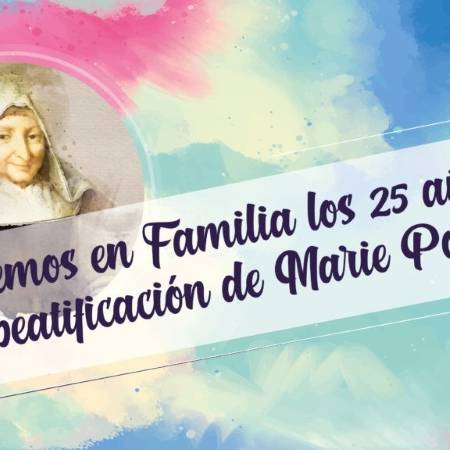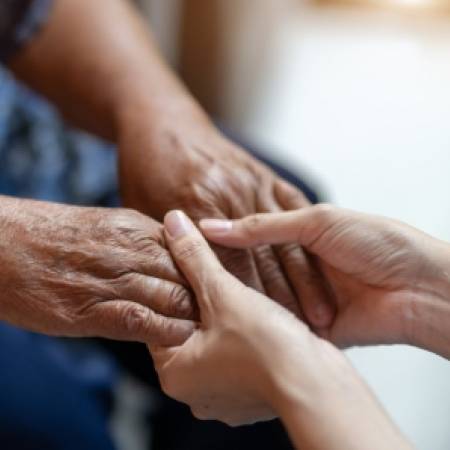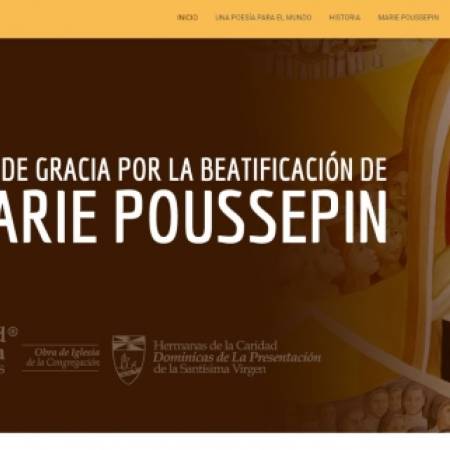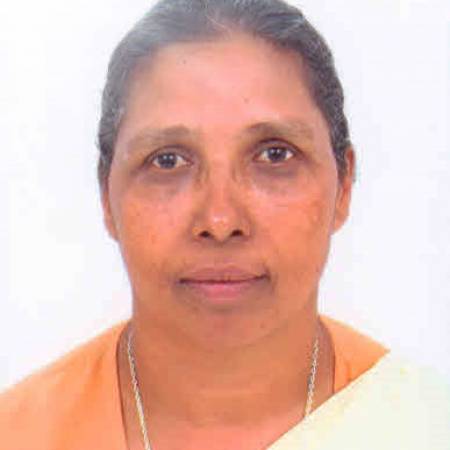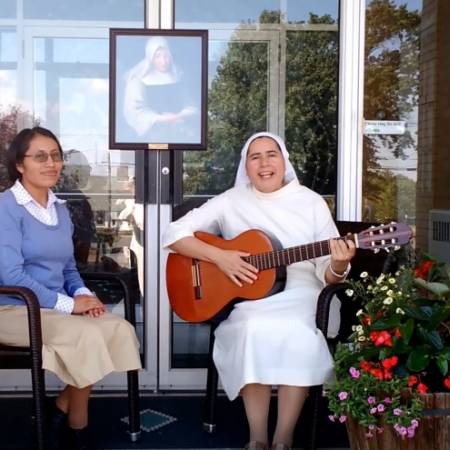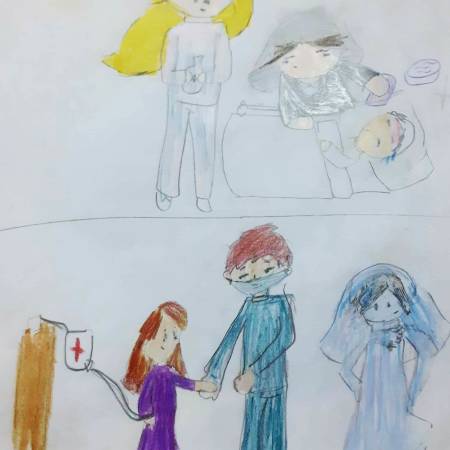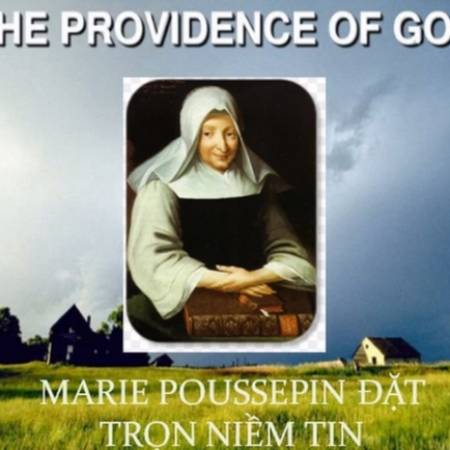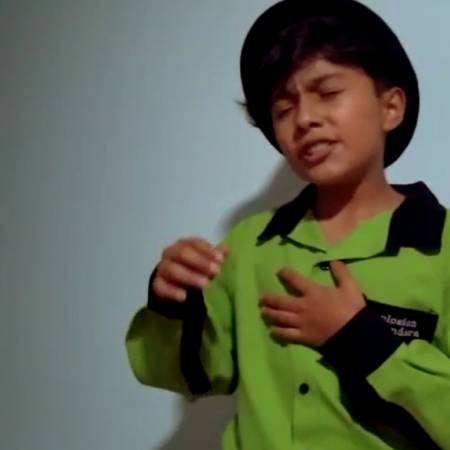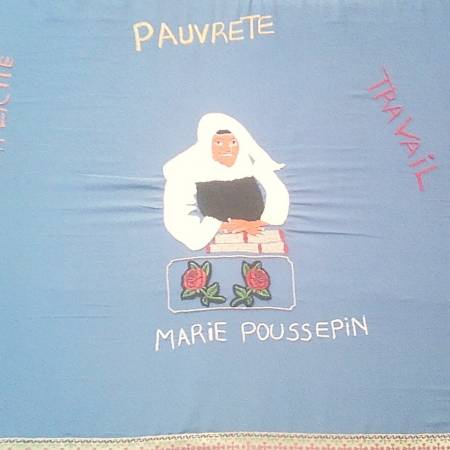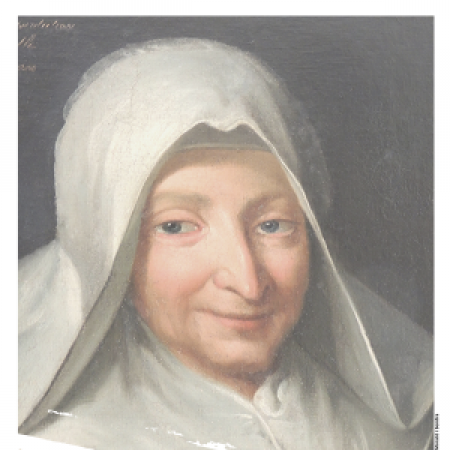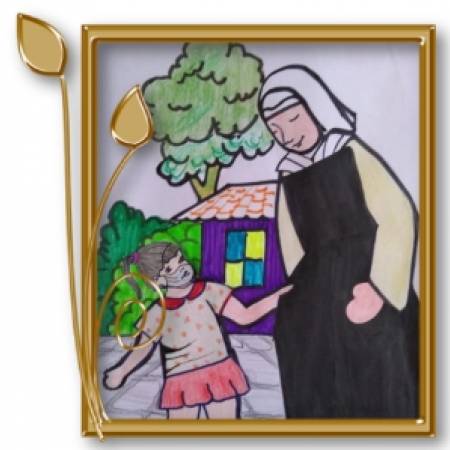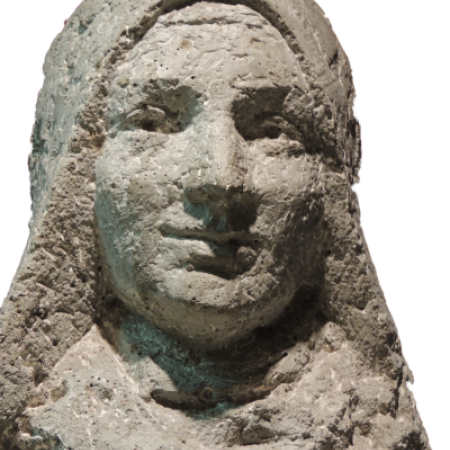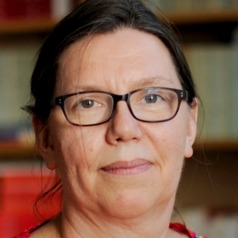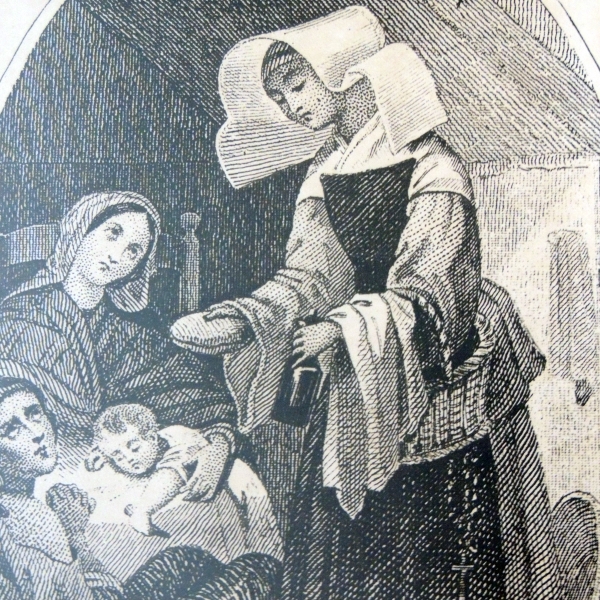I am not going to repeat the life of our Foundress which all of us know, but to insist on three points, which can be used on three occasions for a work personally, in community or with others. As Fr. Bonduelle, a historian told us during the symposium organized on November 30, 1994 at Tours on the occasion of the Beatification:
“Marie Poussepin founds a community at a critical period in the history of the Church and of the West in general. This period which they described as “the crisis of the European conscience”, challenges directly or indirectly, silently or more clearly, the great convictions of the time that had preceded it. I find it very significant and remarkable that Marie Poussepin in her way responds to this crisis, going to the center. This is the gift of holiness, to go to the center at a given period. In her time, Blessed Marie Poussepin understands that the center is charity, the active charity, the effective and intelligent charity and she imagines that she has a glimpse of it and she perceives the issues that the consecrated active sisters can encounter. Didn’t she reach at this perception by supporting herself at the beginning on the charism of St. Dominic?”
I. Charity during the crisis
Then, Marie Poussepin is going to develop from her youth a talent for charity at the time of crisis, through her professional genius as well as through her charitable commitment in the Confraternity of charity. The urgency is to meet the people, be with them and be like them. She discovered that, ever since the garden of Genesis, the name of God is Emmanuel, “God with us.”: “The LORD God was walking about in the garden at the breezy time of the day” (Gn. 3:8). She read the Gospel of St. John and the prayer of Jesus: “Father, they are your gift to me. I wish that where I am, they also may be with me, that they may see my glory that you gave me, because you loved me before the foundation of the world.” (John 17: 24)
1) To be with
“Not without you” God says to man. And the believer who has God under the skin, in his turn, says to his brother or sister, “not without you”. This “not without you” is the decision of God to be with us from the crib to the cross. It is on this conviction that Marie Poussepin builds her life, and later her foundation. “May I never be separated from you,” is the silent prayer of the priest during the Eucharistic celebration. But in turn, it is the prayer of all those who wish to unite their near ones to the good news of the Gospel. Marie is going to establish the works of charity which signify for those who will participate in it, that we are not saved one without the other, and that salvation begins in this life, when life becomes more dignified and freer.
The style of life that she chose for her Community is clear: It will be without cloister; the habit will be that of the country women, with the colors of the Order. It means “to be with” the people, as Jesus was with His people mingled with his own. It is Christ who is the first neighbor, and the first presence is the presence of the Kingdom of God.
2) The notion of closeness in the Gospel
- Proposal for a time of sharing on the Gospel of Lk. 10: 1-11: “The Kingdom of God is close at hand (eggizô)”. What is this close at hand?
After this the Lord appointed seventy-two others whom he sent ahead of him in pairs to every town and place he intended to visit. He said to them, “The harvest is abundant but the laborers are few; so, ask the master of the harvest to send out laborers for his harvest. Go on your way; behold, I am sending you like lambs among wolves. Carry no money bag, no sack, no sandals; and greet no one along the way. Into whatever house you enter, first say, ‘Peace to this household. If a peaceful person lives there, your peace will rest on him; but if not, it will return to you. Stay in the same house and eat and drink what is offered to you, for the laborer deserves his payment. Do not move about from one house to another. Whatever town you enter and they welcome you, eat what is set before you, cure the sick in it and say to them, ‘The kingdom of God is at hand for you. Whatever town you enter and they do not receive you, go out into the streets and say, ‘The dust of your town that clings to our feet, even that we shake off against you.’ Yet know this: the kingdom of God is at hand.” (Luc 10: 1-11)
John the Baptist had said it and Jesus takes up the expression: the kingdom of heaven is near (Mt 3:2). We could translate "the kingdom of God is at hand" (Luke 10:9), or we could interpret: "the kingdom of God is its closeness". It is because he is close to us that he reigns. He does not rule by power, but by closeness. If God's way of being, resides in his closeness (and this was already the case when his word travelled with the people, sheltered by the Ark of the Covenant), in a vulnerable closeness, he can live his life only in closeness.
The passage in Luke 10 is important because it explains how to be disciples. Going two by two means that the closeness of God is announced in the closeness we have for one another. Living common life and caring for the nearest sister, who perhaps, is not my friend, signifies God's closeness to all. This closeness is above all light, it is not overloaded with a caravan of objects or techniques. For, it is in the relationship between one another, which is open to others, that peace is announced. It is then a question of "staying there". To accept to be welcomed, because, if God has given us the grace and the possibility to welcome him/her among us, it is because giving the possibility to another to be welcomed as a gift. It is only after "staying there", eating and drinking what is served to us and after becoming "companions", that we can take care of others, because the ultimate purpose of the disciple is to announce that in this closeness, simply lived together, it is first and foremost God who has come closer, for his kingship is his closeness. The most paradoxical thing is that even in the middle of refusal - for it can happen - this announcement of God's closeness is made (v. 11).
3) In times of crisis
The Church today is going through an extremely severe storm and no country is spared. We discover with horror that in the name of the gospel, sexual crimes and abuses of authority have destroyed people permanently.
It is noteworthy that these are yet unique situations that have not caught the attention of the authorities. But in the end, we discover that these are not unique situations, but rather, a system of blindness and abuse that has brought us to where we are today.
The closeness required from our contemporaries is therefore on two levels: we need to hear each unique painful situation, because true charity exists only in the uniqueness of an encounter, and at the same time, we need to understand the system in order to be able to act. What kind of closeness is required in this context? Whom should we make our neighbor, and how?
- Suggestion for a time of sharing based on the Gospel of Luke 10:25-37 on "Who is my neighbor?”
II. An active charity
Marie Poussepin chose to live an active charity. She invites her sisters and the people she meets to put their faith into action, being convinced that this is how the Gospel shall be proclaimed. This is why her whole life could be summed up in the corporal and spiritual works of mercy,[1] as they are inseparable from one another. Marie writes this with force in the Rule of Sainville.
1) The works of mercy
It is clear that the work of Marie Poussepin comes systematically within the scope of the works of mercy, as we were able to study them in depth during the Holy Year of Mercy in 2015. The Positio summarizes this and refers to the Rule of Sainville: Thus, care will be "corporal and spiritual services to the sick poor of the countryside or in the hospitals." (R. I, XXXVI, XXXVII) Teaching of girls will be oriented towards reading, but also to the truths of religion and arithmetic (R. I and XXVII) (Annex 1).
2) The question of salvation: "What will become of sinners?”
What underlies the practice of the works of mercy is the question of salvation. This was precisely Dominic's cry: "My God, my mercy, what will become of sinners?” An emphasis on this same concern is found in the Rule of Sainville, regarding the reception of postulants and novices:
As charity should be the soul of the community, it will open the door to all persons who will leave the world through a desire of sincere conversion. We will make no distinction of country or of birth; but we will prefer those who have a greater desire to consecrate themselves entirely to the service of God, and among those, even the poorest and those who are in the greatest danger for their salvation must have preference. (R. XIV)
Beyond the reception of novices, it is probable that this concern for those "who are in the greatest danger for their salvation" was a major focus for Marie Poussepin.
- This can lead us to a reflection on salvation.
What is the announcement of salvation today? It is quite clear that if eternal life begins now, salvation is not for later either. If the urgency today is to place ourselves at a time of crisis in the Church, don’t we have to think of salvation as liberation from all that encloses human beings: poverty, solitude and slavery? A text by a Russian author could give us a thought-provoking insight:
Not only must the dead be delivered from death and resurrected, but all beings must be saved and freed from hell. The ultimate requirement of ethics would be translated as follows: - Stretch all the forces of your mind towards that liberation. In the orientation of your activity, do not create hell for anyone, neither in this world nor in the next (…)Do not limit yourself to not creating hell, but destroy it by all means (…) The so-called “good” as well as the so called “bad” ones will have to answer to God; but we have reason to believe that this judgement will be different from human judgement…The “good” will be answerable for having created hell, for having been satisfied with their good, for having elevated their vindictive instincts to a high degree, for having hindered the improvement of the “wicked,” and for having led the “wicked” by their judgement to the path of perdition (…) If it is not given to me to know that there will not be hell, it is given to me to know that it must not exist, that I must, without isolating myself, work for universal salvation.[2]
- What kind of hell do we have to empty today? Who is waiting for us there? And with whom can we " work for universal salvation "? For it is never a work that we can do alone.
III. An intelligent charity
In the Rule of Sainville already in chapter one, after talking about taking care of the isolated sick and the education of girls, Marie Poussepin dares to propose something quite innovative and extremely relevant for our time: "Familiar readings and conferences to older persons on the things necessary for salvation.”
1) To Preach in the feminine way: “to bring to all the knowledge of God and his mysteries”
Marie Poussepin invites her sisters "to bring to all the knowledge of God and his mysteries". Explicit preaching is therefore an authentic work of concrete charity. It is the Community that preaches and is formed for this. In fact, one of the urgencies of her time, and no doubt of ours too, is to form the critical spirit of the Sisters, their intelligence and their reason. Times of crisis are always times in which the unreasonable can lead us to the worst. We see this today with the abuse of authority in the groups that confounded the psychological and the spiritual realms. An authentic spiritual formation is therefore ultimately a duty to avoid falling into these abuses.
It is good to reread here Chapter X of the Rule of Sainville (cf. Annex 2)
It is not a question of being intellectual, but of making the gospel heard in order to put it into practice. But how can we put it into practice, if we have not heard it in all its depth and in full harmony with the whole Bible? Marie Poussepin and her sisters practice an explicit and concrete way of preaching. And it is credible, since as they preach, her sisters take care of the sick and suffering people; they take care of educating young girls to freedom, not only through the household chores of the time, but through reading and arithmetic. Marie Poussepin made preaching a work of charity.
Once again, the issue is closeness: it is a matter of touching the closeness of God with your fingers. The Church is for the world, because Christ is for all. His word is for all; it is a balm, strength and power that invite us to act in this world. But this closeness of God can only be perceived through the closeness of those who call themselves Christians.
History does not say it, but it is possible that Marie Poussepin was inspired by the epistles of Paul such as 2 Timothy 4:1-5.
I charge you in the presence of God and of Christ Jesus, who will judge the living and the dead, and by his appearing and his kingly power: proclaim the word; be persistent whether it is convenient or inconvenient; convince, reprimand, encourage through all patience and teaching. For the time will come when people will not tolerate sound doctrine but, following their own desires and insatiable curiosity, will accumulate teachers and will stop listening to the truth and will be diverted to myths. But you, be self-possessed in all circumstances; put up with hardship; perform the work of an evangelist; fulfill your ministry.
- Where are women's voices expected to be heard? How can we live out Paul's recommendations?
This aspect of our history calls us to a serious theological formation, but not only that. Our foundress invites us to reflect on it "with others" and “for others", since she wanted these conferences to be born in the simplicity and closeness of fraternal life, "for the glory of God and the good of our neighbor".
- The place of women in the Church is an issue that we can no longer put under the carpet. It probably takes a different form in each of the countries where we are present. How do we address this issue where we are present?
2) A fair exercise of authority
Marie Poussepin had decided to change the orientation of her business, to revive it by making woolen stockings; then she left the business in working condition to her brother. With the sisters who joined her, she imagined that a Dominican religious life without cloister was possible. In the guidelines that she gives to her newborn institute, she has no exceptional insights; she slips into the spaces left open by the public authorities, but within these spaces she allows a form of preaching subversion; she authorizes herself and her sisters to preach and this, without putting herself in the forefront. She exercises a form of authority as understood by the Jesuit historian Michel de Certeau:
"The authority authorizes. It makes possible what previously was not possible. As a result, it "enables" something else, in the way that a poem or a film inaugurates a perception that would not have been possible without it; you don't see or think the same way afterwards.(...) The authority makes a difference; it brings about a change in the way of looking at things, in the way of living and thinking. It (...) places itself on the side of the conditions necessary for the possibility.”[3]
The closeness of Marie Poussepin with her family, in Dourdan and then in Sainville, is not a presence that is imposed. When her brother decides to make the young boys in the workshop pay the apprenticeship tax again, she no longer signs the contracts, but stays there, since they all live in her home. When she takes in Marie Olivier, she gives her bed to her. She founds her institute with others. She wants to develop the talents of others and their generosity. She leaves us the portrait of some kind of a robot for a Dominican Sister of Charity that each one of us can dress up with her own clothes and her own spirit. The question she leaves us is, how does the Gospel really open us to a true inner freedom in which we can grow and help other men and women to become free? Are not all corporal and spiritual works of charity at the service of the freedom that Christ promised us? A freedom that makes no noise, but is built up by being close to those who are close to us, in the Church and in the professional or social life, a freedom in which humility has nothing to do with submission.
“She saw what is right in the eyes of God and did it.”
*Sr. Anne Lecu is a sister from the Province of France. She has been working as a doctor at Fleury-Mérogis, one of the biggest prisons in Europe, 10 miles south of Paris, for the past 23 years. She also holds a doctorate in philosophy for her work on the effects of being jailed and has written five books dealing with issues such as shame, innocence and God's mercy. In a one, “Tu as couvert ma honte” (You have covered my shame), she explains, with examples from Scripture, how God pushes aside our bad deeds because he is not interested in our crimes; God only wants to be in touch with the part of us made in his image, she writes.
Annex 1. Rule of Sainville 1
R. I. “This community is an assembly of Sisters united together to consecrate themselves in a special way to the service of God and neighbor. Their aim is to imitate by their conduct, as much as persons of their sex can, the life that Our Lord led on earth, and to walk in the paths of these holy persons, who applying themselves within their Houses to the exercises of piety, gave themselves on the outside to all that charity would inspire them. Charity is, of all the virtues, the one which Our Lord recommended the most to us. He practiced it with such care that all His life was a continuous exercise of charity. His adorable heart burned with love for His Father and for all men. All His actions were done with the sincere desire to please God. Not satisfied with working for the healing of our souls, He also wanted to effect that of our bodies and to provide for all our needs,
The Sisters will make every effort to maintain in themselves this divine virtue. They will practice it toward God, maintaining an unassailable fidelity to the most exact observance of the maxims of the Gospel, the precepts of the Church and the promises of their Baptism. Fully convinced that the exterior practices of piety lead us there, they will be assiduous in all exercises of religion held at their parish, and to all the points prescribed by the Rule.
They will practice charity toward their neighbor, and for this they will render corporal and spiritual services to the sick poor of the countryside or in the hospitals for which they are responsible.
They will work at teaching the little girls the truths and maxims of Religion with readings, writings and works that would be appropriate for their age.
In their homes, they will do familiar readings and conferences to older persons on the things necessary for salvation, and they will receive in their home those who wish to make a retreat. (…)”
Annex 2. Rule of Sainville X
Reading is one exercise of piety which members of the Community should never omit. “Man, says Our Lord (Mt. 4:4) does not live on bread alone but on every word that comes from the mouth of God.” St Athanasius considers reading so necessary for a person who wants to walk in the ways of God that you will never see anyone, he says in his exhortations, truly attached to His service, who is not given to reading. Saint Augustine (Ep. Ad Virg. Denutriad. 143)explains it no less forcefully. Read the Holy Scriptures in such a way that you will always remember that all the works that are there are so many words from God, who not only wants us to know His law but also to follow it. This divine reading, according to Saint Ambrose, is the life of the soul, and this is what the Lord wanted to teach us when he said in St. John that his words are spirit and life.
Therefore, if the Sisters want to live a spiritual life, to walk in the ways of God, to be kindled more and more each day in the fire of His love, they should not let one day pass without giving reading the required time. The real way to profit from this, is to apply to ourselves what we are reading. You will make good use of Sacred Scripture, said Saint Augustine and Saint Gregory, (Aug. Ep. 143 ad eandem.) if you use it as a mirror, so that your soul, looking upon itself, corrects itself of all that is bad, and perfects that which is good. What these saints say about Sacred Scripture must also apply to all sorts of spiritual readings, since these books contain the same truths which these Saints have tried to make more intelligible for us. These instructions are for all persons, but they touch the Sisters especially. One of the principal duties of their state of life is to teach youth, to give spiritual conferences to persons of their sex more advanced in age, not only to withdraw them from the disorders, into which ignorance and passion might have led them, but also to help them move on to their salvation. And how would they succeed, if they themselves were not filled with the truths contained in books of piety.
These conferences on the reading done in advance will be held every Sunday and feast day, in the Community as well as in the parishes. The Sisters responsible for speaking will limit themselves to what had been read, and they will be content to explain it with simplicity, carefully avoiding vanity, and seeking only the glory of God and the good of neighbor (R X).
[1] We remember that the corporal works of mercy, of which there are seven, take up chapter 25 of the Gospel of Matthew: Giving food to the hungry, Giving drink to the thirsty, Clothing the naked, Welcoming strangers, Assisting the sick, Visiting prisoners and Burying the dead. But these seven works are supplemented by spiritual works, also seven in number: Counseling those in doubt, Teaching the ignorant, Warning sinners, Consoling the afflicted, Forgiving offenses, Bearing patiently the annoying ones and Praying to God for the living and for the dead.
[2] Nicolas BERDIAEV, De la destination de l’homme, essai d’éthique paradoxale, Lausanne, L’Age d’Homme, 1979, p. 361-363.
[3] Michel de Certeau, La Faiblesse de croire, Paris, Seuil, 2003, p. 119-120.


 EN
EN  ES
ES  FR
FR 




